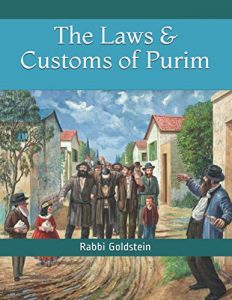
*As an Amazon Associate I earn from qualifying purchases.
Shushan Purim:
Increasing in festivities in un-walled cities:[1] One is obligated to slightly[2] increase in joy and festivities on Shushan Purim [during the day[3]], and so is the custom.[4] [However, on the night of the 15th, there is no need, for those who celebrated Purim on the 14th, to increase in festivities.[5] Nevertheless, many have the custom to do so.[6] Many scrupulous Jews increase in festivities and festive meals on the day of Shushan Purim even more than on Purim itself.[7] In years that Purim falls on Friday, one is to increase in delicacies and festivities by the Shabbos meal in honor of Shushan Purim.]
Tachanun:[8] Tachanun is omitted on the 15th in all cities. [Thus, when the 15th falls on Shabbos [i.e. Purim Meshulash for Jerusalem residents] one omits Av Harachamim from the Shabbos Musaf prayer and omits Tzidkasecha from the Shabbos Mincha prayer.] Some are accustomed to omit Tachanun from the 11th until the 17th of Adar.[9] Some also omit Tachanun from the 23rd of Adar until the end of the month.[10] This is not the Chabad custom.]
Keil Erech Apayim:[11] The prayer of Keil Erech Apayim is omitted on Shushan Purim.
|
Q&A on Shushan Purim Meshulash In a year of Purim Meshulash, are the cities outside Jerusalem that celebrated on the 14th to also add in celebration on Sunday the 16th? Yes. Those cities that celebrated on the 14th are to increase in festivities also on the 16th.[12] They are to have a special Shushan Purim feast on Sunday the 16th, as opposed to Motzei Shabbos.[13]
In a year of Purim Meshulash, is Tachanun to be recited on Sunday in cities that celebrate on the 14th? Some[14] write it is proper to omit Tachanun in all cities on Sunday the 16th, in a year of Purim Meshulash. [Nevertheless, this is not the widespread custom.] |
________________________________________________________________
[1] Rama 695:2
[2] So writes Rama ibid. However, see Minchas Elazar brought in the footnotes below that one is to increase in festive meals on the 15th just like as on the 14th and even more so.
[3] Shaar Hatziyon 695:4; The Nimukei Orach Chaim 696:1 explains one does not fulfill the law written in the Rama ibid on the night of the 15th, as one who does the meal at night does not fulfill his obligation. See also Poskim in coming footnotes
[4] The reason: As the verse states “on these two days”, hence one must rejoice on both the 14th and 15th. [Darkei Moshe 695:4]
[5] Shaar Hatziyon 695:4; See Nimukei Orach Chaim ibid
[6] Levush 695 brought in Kaf Hachaim 695:28; Minchas Elazar 2:5; Nimukeiy Orach Chaim 696:1; Mishmeres Shalom 50:5
The Mishmeres Shalom ibid writes that the Tzaddikim would have a second meal on Motzei Purim [night of the 15th] and that such a meal has great mystical meaning. The Nimukei Orach Chaim ibid however explains that this meal does not fulfill the law written in the Rama ibid to increase in festivities on the 15th, as one who does the meal at night does not fulfill his obligation. [695:1]
[7] Minchas Elazar ibid; See Shulchan Menachem 3:329 that one must especially increase in joy when Shushan Purim falls on Shabbos; see Otzer Minhagei Chabad 229 that the Rebbe stated on certain occasions that the Mitzvah of Ad Delo Yada applies likewise on Shushan Purim, and one can do a Hashlama for it on the Shabbos after Purim.
Background:
The Minchas Elazar explains that in the source of the Rama’s ruling in the Sefer “Minhagim” it states that one is obligated in festivities on both the 14th and 15th, and does not make a differentiation between the 14th and 15th. Hence, the obligation of Simcha and festive meals applies equally to both the 14th and 15th. He brings many proofs for this matter [and hence negates the Rama’s opinion of only increasing “slightly”]. Now, since on the 14th, people are very busy with the other Mitzvos of Purim there is not much time for them to properly fulfill the Mitzvah of Simcha and Mishteh. This is hence mainly fulfilled on the 15th, when there are no other extra Mitzvos that one must perform. See Shulchan Menachem ibid that the Rebbe states that this is the opinion of the Sheilasos and Bahag that one must rejoice on both days, although it is not brought down in Shulchan Aruch.
[8] Siddur; See also 696:3 that fasting and eulogies are forbidden on both days.
[9] See Piskeiy Teshuvos 688:19; Darkei chaim Veshalom 191; Shulchan Hatahos Komrana 131:28; Mishmeres Shalom end of Sefer; Taamei Haminhagim 878; Kochav Meyaakov Yerushalmi Megillah 1:4
[10] Darkei Chaim Veshalom 191
[11] Siddur Admur; Levush 697; P”M 697 A”A 1; M”B 697:2
[12] Olas Shmuel 110; Nimukeiy Orach Chaim 688:2; Piskeiy Teshuvos 696:4; See Shulchan Menachem 3:331 from Likkutei Sichos 21 p. 490
[13] Nimukeiy Orach Chaim ibid
[14] Piskeiy Teshuvos 693:7; Purim Hameshulash 7:1; See Likkutei Sichos 21 p. 490 that the Rebbe suggested for all cities to add in festivities on Sunday, and they should even give Mishloach Manos and Matanos Laevyonim.



Leave A Comment?
You must be logged in to post a comment.